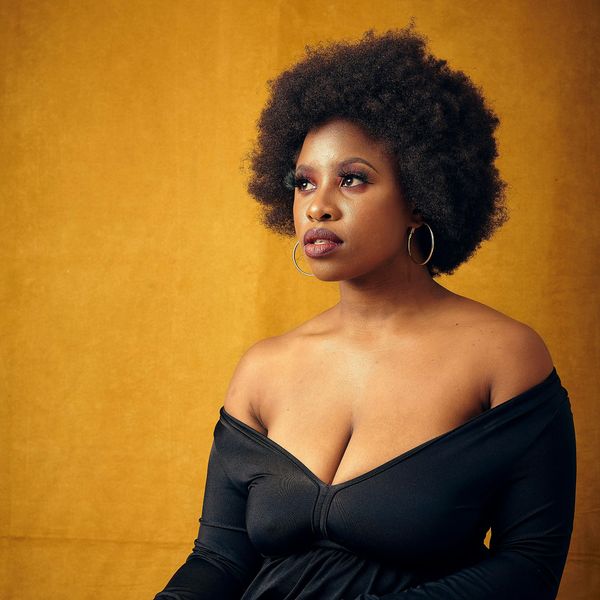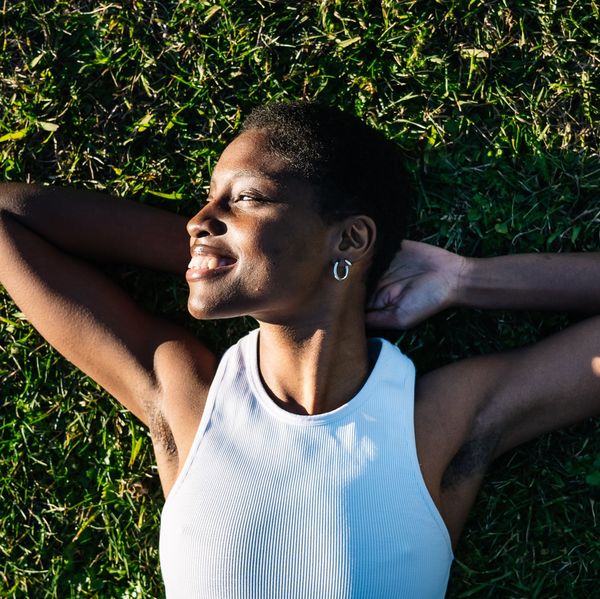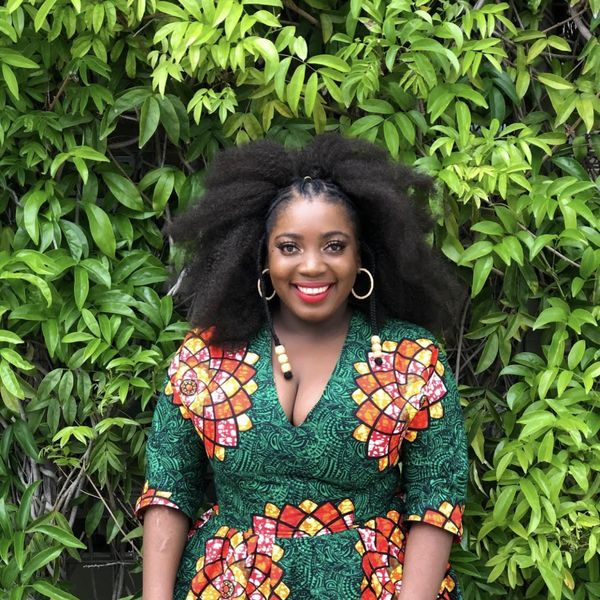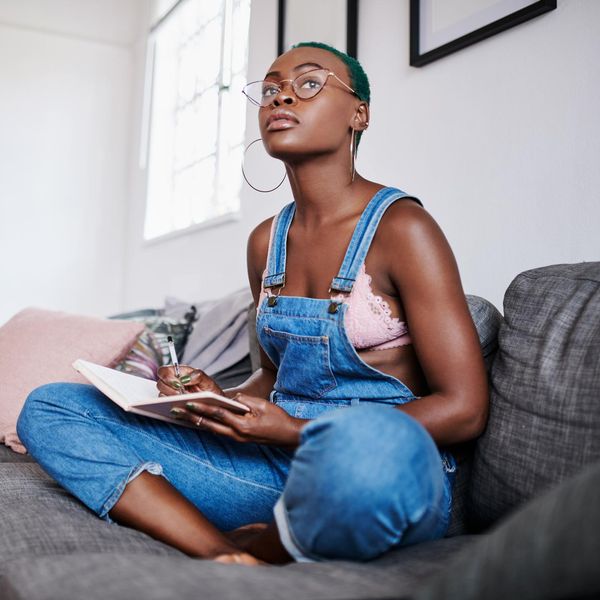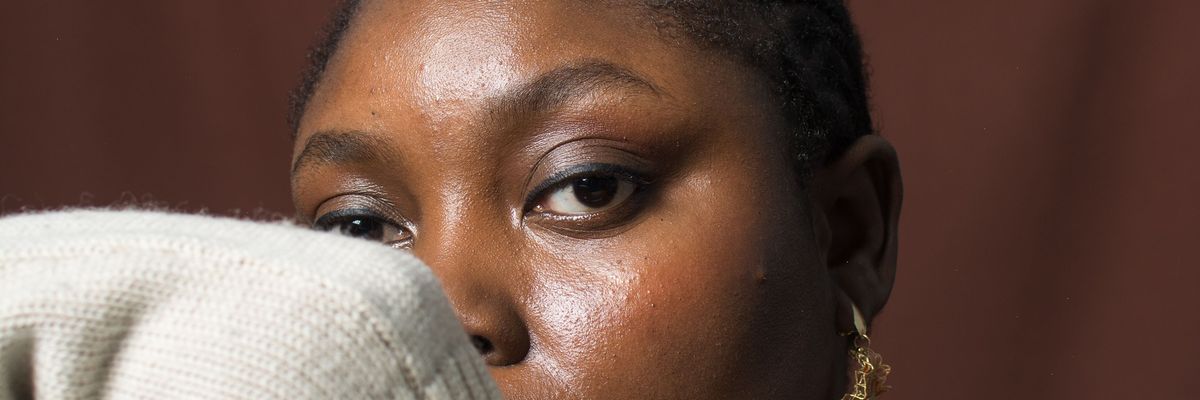
Something that I am really big on is doing things that will heighten self-awareness and tap into a deeper level of emotional intelligence. One thing that is sure to do that is self-introspection and one of the best practices for that is to ask yourself questions. While I’m pretty sure that, just like me, you can’t believe that we’re headed into — what in the world?! — 2022, before your calendar officially ushers in January 1, pull out one of your journals (‘cause I know you’ve probably got more than one) and ask yourself the following seven questions. If you’re serious about answering them, it could provide you with just the clarity that you need in order to move fully forward into a brand-spanking new year.
7 Self-Reflection Questions to Prepare for the New Year
1. “Did I Accomplish All That I Set Out to Do This Year?”
Something that I personally find to be pretty unfortunate is how so many people think that focusing solely on their looks is what will make them feel good about themselves when it’s actually setting goals and reaching them that will take their self-confidence to an entirely new level. Keeping that in mind, when you reflect on these past 12 months, what did you accomplish that you are truly proud of? For instance, for me, I set out to make real and complete peace with how some of my past trauma and poor decisions as a result of said trauma have resulted in some of my current outcomes.
An example? Being sexually molested as a child and teen definitely played a role in my abortions (long story) which resulted in years of healing which resulted in my being in my late 40s now with no children. I am not someone who will say I don’t have some regrets tied into all of this (check out “Why Regret Might Not Always Be A Bad Thing”) because I do. Regret means remorse and having remorse is a good thing. Anyway, even though my cycles (periods) are still on-point and I’ve got more than a few good eggs (I roll my eyes at my doctor whenever we discuss it), I’m at peace with not being a mom now — partly by circumstance and partly by choice. And because I set out this year to get to this space, I now look at where I am in life as a new season rather than replaying so many woulda-coulda-shouldas. And yes, that is a big accomplishment in my world because I am confident that I will make decisions out of wholeness, not fear.
I’m sharing all of this to say that an accomplishment doesn’t have to be professional or even huge. It just needs to be something that you wanted to get done and you did. When it comes to what you said you were going to focus on in 2021, what can you put a gold star on with pride? Whatever it is, pat yourself on the back. You’ve earned it.
2. “Am I As Devoted to My Purpose As I Need to Be?”
Let me tell you two things that I will fight to the death over — my purpose and my peace of mind. I don’t care what person, place, thing, or idea is trying to stand in the way, if you’re not an “ally” in those areas for me, you’ve gotta go. You just do. That’s how loyal I am when it comes to why I was put on this planet and what kind of mentality I need to have in order to manifest my purpose on a daily basis.
You know, one of the worst things that you can ever do with your time and really, your life overall, is to never really know, with complete clarity, what your purpose is (check out “5 Signs You Are Living Your True Purpose” and “How To Handle ‘Purpose Fatigue’”). The next thing is to allow so many other things to distract you that you never end up fulfilling it. Only you know if you’ve been as loyal and committed to the reason why you were put on this planet, to begin with. The good news is if you haven’t been, there is no time like the present to do some serious and significant rerouting. Make sure that you bring peacefulness along with you. Your purpose will not fulfill itself without it.
3. “Am I Spending? Or Investing?” (Across the Board)
I recently saw a tweet where someone was saying that we should stop investing in people who don’t really care about us. My immediate thought was, “If you’re not in something that consists of consistent reciprocity, you aren’t ‘investing’, you are spending. And honestly, you actually could be wasting time, resources, energy, etc.”
Mark 2:22(NKJV) says, “And no one puts new wine into old wineskins; or else the new wine bursts the wineskins, the wine is spilled, and the wineskins are ruined. But new wine must be put into new wineskins.” This basically means that it makes no sense to put what is new into what is old because you’ll end up wasting (some of) it. Matthew 7:6(NKJV) says, “Do not give what is holy to the dogs; nor cast your pearls before swine, lest they trample them under their feet, and turn and tear you in pieces.” For the record, one definition of swine is “a coarse, gross, or brutishly sensual person”; another is “a contemptible person”. When dealing with “swine”, it doesn’t know how to value you because, well, it’s swine.
So yes, when you put these verses together and you apply them to this particular question because time is short and life is far too precious, it is absolutely imperative that you reflect on who and what are actual investments and who and what is actually causing you to spend without getting much of a return or waste without anything to show for it at all. I don’t care if it’s personally or professionally, familial, platonic or romantic — you deserve to have people invest in you as much as you choose to invest in them. Is that currently happening in your life or…not?
4. “Who Do I Need to Get Closure From?”
The more I talk to people who prefer to ghost someone rather than get closure with them, the more I have come to the personal conclusion that far too many people function from a place of fear. A part of the reason why I’m such a fan of closure is because I communicate for a living and, even when something comes to an end, I think the dignity of communicating is important. Another reason is because oftentimes, bitterness, resentment, and unforgivingness can reside in people for years because they assume about what led to the breakdown of a relationship or situation rather than getting the information that will help them to truly know. And finally, and perhaps most importantly, the people in your future — the ones who have absolutely nothing to do with what someone else did to or didn’t do for you — deserve you getting closure so that they don’t have to overcompensate in areas that are absolutely not their issue or fault.
My dad took his life almost eight years ago. The amount of people who hurt him over the course of his life is endless. Some of those same people have hurt me, so I get it. Yet his approach was to ghost, internalize and use substances to ease the pain. Mine was to confront as many as possible to, at the very least, get the reasons behind why they did what they did. And because I got that closure, I know to not expect every person to be like those people. I know not to put a residue of pain onto everything. I also know the kind of foolishness that is in my bloodline, on both sides, that I absolutely and proactively need to avoid.
It takes courage to get closure. There ain’t no way around that. However, I am a personal testament to the fact that getting it is better than running from it. Standing firm rather than running is better across the board, actually. That’s another article for another time, though.
5. “Where Am I Spiritually?”
You can check out articles that I’ve written for the site like “What's The Difference Between Being 'Religious' And Being 'Spiritual', Anyway?”, “7 Signs You're Spiritually Compatible With Someone”, “7 Spiritual Principles About Sex That Married Couples Should Never Forget”, “Here's Exactly How To Start Protecting Your Spirit” and “I’ve Got Some Ways For You To Start Pampering Your Soul” and know that when I speak of “spiritual”, I am not talking about religion. What I do know, though, is if you don’t put your spiritual health and well-being above, pretty much anything else, everything else will suffer — if not immediately, eventually.
And just what are some telling signs that you are in a good place on the spiritual tip?
- Prayer and meditation are consistent practices.
- You function from a place of boldness rather than fear.
- You respond more than react.
- You would rather be happy than right.
- You know how to take accountability for your actions.
- You extend the kind of mercy and grace that you wish to receive.
- You make time for creativity.
- You see humility as a strength, not a weakness.
- Empathy and compassion are important to you.
- Your vibration is high.
If there’s one thing that this world doesn’t want you to be, it’s spiritual. After looking at some of these signs of spirituality, I’m pretty sure you can see why. As you think back on this past year, where did you flourish spiritually and where is there still a lot of room for improvement? Focusing on even one of these 10 things can make you such a better person. That, I can guarantee.
6. “Where Can I Improve When It Comes to Self-Care?”
Please sis, if you don’t do anything else in the upcoming year, free yourself from the bondage of thinking that maintenance is pampering. I speak from very up close and personal experience when I say this too because, prior to getting pedicures and waxes on a monthly basis, I used to see those things as a way to pamper myself. Nope. Those are maintenance. Pampering is about being self-indulgent for no other reason than you are worth it.
I believe that’s a good way to introduce this particular question because self-care is so paramount. And yes, it includes consistent maintenance, pampering, and also doing whatever will keep your mind, body, and spirit thriving. When it comes to what self-care actually means, one wise person said, “Be enough for yourself. The rest of the world can wait.” A mental health expert by the name of Katie Reed once said, “Self-care is giving the word the best of you, instead of what’s left of you.” And civil rights leader Audre Lorde once said, “Self-care is not self-indulgence; it is self-preservation.” Shoot, even Christ himself has gone on record as saying, “Love your neighbor AS YOURSELF.” (Mark 12:30-31)
If you look up dictionary definitions of self-care, you will see words like “soothe,” “comfort” and “attending to one’s physical and mental health.” There are a lot of us who run on fumes, constantly, because we are finding ways to do these things for everyone and their grandma but ourselves. Shoot, some of us even struggle with feeling guilty for even contemplating putting ourselves on the top of our “care” list. If you are one of them, don’t. You can’t be your best genuine self without self-care and yes, that includes pampering. If you didn’t do it enough last year, make it the ultimate priority in the year that lies ahead.
7. “What Can I Do to Avoid Experiencing a ‘Rerun Life’?”
Y’all, I haven’t watched that Sex and the City reboot. For what? I barely even watch the reruns of the original show now…because I’ve pretty much outgrown them. The entertainment and sometimes ah-ha moments that they provided many moons ago, they don’t now. I’m a different person. I’m in a different headspace. What’s next? WHAT’S NEW? (Yes, I am yelling it because all of these reboots, chile, are doing THE most!)
A lot of my life is similar. These days, very few people, places, things, and ideas from my past hold my attention. Not because they didn’t serve their purpose or at least a reason — whatever that was — at the time; it’s just...very few people, places, things, and ideas are just so monumental to me now that I want to replay them over and over again. Sometimes I reflect for nostalgia’s sake and that’s cool. Other than that…again, what’s next? WHAT’S NEW?
Whenever I think of a “rerun life”, I think of that doggone hamster, running for dear life, in a wheel that is getting him absolutely nowhere. Listen, I don’t care if it’s at work, at home, in your friendships, when it comes to your spending habits, your church life, your health, sex, communication — y’all pick one…if you know that you are in your own hamster wheel, right now, jot down some ways where you can break all the way out in 2022. It makes absolutely no sense to spend (or is it waste?) all of that time, effort, and energy, blood, sweat, and tears on stuff that really isn’t getting you anywhere…isn’t expanding the quality of your life.
2022 is right up the street, y’all. The answers to these questions can help you to enter in on a higher plane. And who doesn’t deserve that? New year. New you. Let’s do this!
Featured image by Getty Images
Your December 2025 Monthly Horoscopes Are All About Surrender & Alignment
December is about letting go. We end the year with the need for more peace, reflection, and rejuvenation, and that is exactly what December is providing for us. The Sun is in Sagittarius, and anything is possible. This is the month to believe in that and to know that the universe is supporting you. With a Supermoon in Gemini as we begin the month as well, we have an opportunity to gain the closure we have been looking for this year and to wrap up old projects, ideas, and communication breakthroughs.
This is the month to make your peace the priority and let go of trying to control the way the tides are turning. Trust in your new beginning, and give yourself time to prepare for it this month.
A big part of the clarity that is coming through this month is due to Neptune going direct in Pisces on December 10, after being retrograde here since July. With Neptune now direct, we are able to see our inspiration and creativity a little more clearly, providing the perfect energy for dreams and manifestation to be built upon. The smoke is clearing, and it’s up to you to decide what you want to do with this newfound clarity that this transit is bringing. Mercury also moves back into Sagittarius on December 11, which is great for communication and clarity, and the adventures you were trying to see through at the beginning of November come around for you again with greater purpose and support.
On December 15, Mars enters Capricorn until the end of January 2026, and this is the extra push we need to make important changes and to be on the path towards greater abundance, stability, and prosperity. Mars in Capricorn takes care of business, and we have extra energy at our disposal during this time to do so. This transit is an ideal time to focus on your career or financial goals for next year and to start putting some of these plans into motion now. A few days later, we have the New Moon of the month, which will be in Sagittarius on December 19, and this is the perfect New Moon to manifest.
The energy is high, magic is in the air, and it’s all about moving forward with the new beginnings that are inspiring you and bringing you joy to think about right now.
Capricorn Season officially begins on December 21, and this earth sign energy is how we heal, gain closure, and build new foundations in our world. With Venus also moving into a Capricorn a few days later, there is something about peace, prosperity, and security that we are gaining in life and in love as we close out the year, and this is what we need right now. This month is about reflecting on what was, letting go of old hurt, and renewing. December is an ending and a new beginning in one, and there is magic in this space to be created.
Read for your sun and rising sign below to see what December 2025 has in store for you.
 AriesKyra Jay for xoNecole
AriesKyra Jay for xoNecoleARIES
December is a full-circle moment for you, Aries. You are seeing the gifts in your world and have a lot of gratitude for the way things have come about for you as of late. There are culminations in your world that are providing you with more abundance, stability, and community, and you are exactly where you are meant to be this month. With the Sun in a fellow fire sign and in your 9th house of travel for most of the month, December is a good time to get out of your comfort zone, explore the world around you, and get your body moving.
Mars, your ruling planet, also makes a change and moves into Capricorn on December 15, which will fuel your inspiration and power in your career space. You are making a lot of professional progress as we close out the year; however, make sure to be more mindful of your competitive drive right now. The New Moon on December 19 is the perfect opportunity for you to create some new plans and goals when it comes to traveling, education, and where you want to gain some new inspiration in your world. Overall, this is a month of things coming together for you serendipitously.
 TaurusKyra Jay for xoNecole
TaurusKyra Jay for xoNecoleTAURUS
December is about trusting your intuition, Taurus. You have a lot on your mind this month, and it’s best to delegate, communicate, and allow yourself some relief by opening up to someone and not feeling like you have to hold everything in. As we begin the month, we have a Supermoon in Gemini happening in your house of income, and the plans and projects you have been building here come to fruition for you now. This is the time to gain clarity on your financial world and to take a look at what spending habits you want to let go of here as well.
With Venus in your 8th house of shared resources for most of the month, you are doing a cleanse on your commitments, partnerships, and business ventures. You are taking a look at what you want to dedicate yourself to in the future, and what commitments you may need to let go of now in order to be in the space you truly want to be, both financially and within some of your relationship dynamics. Before we end the month, we have a New Moon in this same area of your chart, and it’s time to look at the opportunities that are presenting themselves and to trust your internal guidance system to lead you forward.
 GeminiKyra Jay for xoNecole
GeminiKyra Jay for xoNecoleGEMINI
You are moving forward fearlessly this month, Gemini. December is your month of love, passion, and dignity, and you are owning the light that you shine. We begin the month with the last Supermoon of the year, happening in your sign, and you are stepping up to the plate. You are showing up, owning how much you have grown this year, and allowing yourself to heal while also acknowledging that you have done your best and you deserve to have fun in the midst of the changes you are creating.
Mercury, your ruling planet, is officially out of retrograde, and you can use this energy to the fullest potential now. With Mercury in your 7th house of love, it’s time to speak from the heart and to talk about the things that matter and that are inspiring you right now to your loved ones. You never know what kind of epiphanies you may have when you open up the conversation to others. Before the month ends, you have a New Moon in this same love area of your chart, and this New Moon is all about manifesting romance, commitment, and abundance in your world.
 CancerKyra Jay for xoNecole
CancerKyra Jay for xoNecoleCANCER
December is an opening for more love, more joy, and more freedom in your life, Cancer. You have come to a place where you hold so much gratitude in your heart for where you are today and where your heart is shining, and things come together for you with more ease right now. With the Sun in your 6th house of health, work, and daily routines for most of the month, you are getting your ducks in a row while also putting more energy and effort into taking care of yourself, your priorities, and your well-being. This month surprises you in many ways, and it’s because you are showing up.
Mars and Venus both move into your house of love, relationships, marriage, and abundance this month, and you are making strides in your love life. You have both of these opposing forces on your side and are being recognized for the love you are while also receiving the love you want. This month, overall, is about focusing more on the positives in your world and letting your heart have its joy. Before December comes to an end, there is a New Moon in Sagittarius, and this is the perfect opportunity to create the plans you want to see through next year, especially when it comes to your work life, colleagues, business ventures, and health.
 LeoKyra Jay for xoNecole
LeoKyra Jay for xoNecoleLEO
The scales of karma are balancing, and they are balancing in your favor this month, Leo. December is your month of truth, and of seeing it clearly in your world. The Sun is in your house of romance, pleasure, and happiness for most of the month, and it’s time to relax, be in the present moment, and allow what is meant to be, to be. With a Supermoon in your 11th house of manifestation as December begins, this is a powerful month for seeing your dreams come to fruition, and for feeling like the intentions you have set this year are finally here for you now.
Mars also moves into your 6th house mid-month, and this is the perfect energy to have to move into the new year. You have extra energy at your disposal right now and are feeling fearless with what is possible for you and your daily routine. Before the month ends, we also have a New Moon in a fellow fire sign, Sagittarius, and this is a breakthrough moment for you and your heart. December, overall, wants to show you how loved and supported you are and will be doing so in magical, unexpected, and concrete ways.
 VirgoKyra Jay for xoNecole
VirgoKyra Jay for xoNecoleVIRGO
December is a month of victory, Virgo. You are showing up and experiencing some new successes in your world that move you forward on your path in life. With a Supermoon in your 10th house of career as we begin the month, the effort and intentions you have made this year come into full bloom, and you are being recognized for who you are and the good work you have done. This month is all about showing up and allowing yourself to be seen and loved, knowing that you deserve the support and opportunities you are receiving.
Mars moves into Capricorn on December 15, which brings the passion and excitement into your love life, hobbies, and little pleasures in life that light you up. You want to have fun this month and are going to be walking into the new year with this fearless, happy, and spontaneous energy within you. Before the month ends, Venus also enters Capricorn, and in this same area of your chart, you have a lot to look forward to and believe in right now. Overall, December wants you to be happy and will be doing everything possible to make that happen for you. This is your month to shine, Virgo.
 LibraKyra Jay for xoNecole
LibraKyra Jay for xoNecoleLIBRA
December is a month of opportunity for you, Libra. New doors open, and you are financially making breakthroughs this month because of it. December begins with a Supermoon in your 9th house, and you are getting a clearer view of where you have been making strides in your life and how it has all brought you here to this present moment of freedom. This month is showing you what happens when you are fearless with your purpose and when you believe in yourself and what you are worthy of.
Moving further into December, Mars moves into your 4th house of home and family mid-month, and you are closing out the year in your safe spaces. You are spending more time with your loved ones and taking the time to quiet your mind and listen to what your heart has been telling you. Before the month ends, we have a New Moon in Sagittarius, happening in an area of your life that deals with communication. This is a great time for getting the answers you have been looking for and for feeling more clear-headed and confident about the decisions you are making as you move into the new year.
 ScorpioKyra Jay for xoNecole
ScorpioKyra Jay for xoNecoleSCORPIO
Patience is a virtue this month, Scorpio. December is all about remaining patient and vigilant with what you are creating in your world, and knowing that the universe has your back. It’s time to be reminded of the power of hope, and this month is an opening to greater clarity in your life. There is a lot of energy in your financial zones right now, and this is providing you with new opportunities and new insight; however, the speed at which things come about for you may feel daunting. Keep your head up and eyes focused on what you want and know that you are more than worthy of receiving it.
With Mercury in your 2nd house of income this month, December is a good time to plant new seeds and to think about where you want to be financially a month from now or even a year. This month is asking you to think bigger and to think more long-term so that you can set the appropriate plans into motion now. We also have a New Moon in your house of income before the month ends, and this is when you will see more of your dreams come to fruition in this area of your life, and have more opportunities to build. Overall, December will be teaching you a lot, Scorpio.
 SagittariusKyra Jay for xoNecole
SagittariusKyra Jay for xoNecoleSAGITTARIUS
Sagittarius Season is here, and there is a lot in store for you this month, Sag. December is all about what you are dedicating yourself to. It’s about setting your intentions and putting the work in to back up your dreams, and about getting things in order so that when the new beginnings come, you are ready for them. The Sun and Venus are in your sign for most of this month, and there are a lot of eyes on you right now. You have the potential to create a new beginning for yourself, and it’s time to invest in yourself, your love life, and your dreams.
Mercury moves into Sagittarius on December 11, and this is giving you another opportunity to see through some of the plans that you had initiated in November. Mercury was retrograde in your sign last month, and there may have been some disruptions to your vision and plans for the future, and now this energy is turning around for you. Before the month ends, we also have a New Moon in Sagittarius, and you are walking through new doors fearlessly. You are catching others by surprise by your growth this month, and you are thinking a lot about your purpose, future, and plans for the new year.
 CapricornKyra Jay for xoNecole
CapricornKyra Jay for xoNecoleCAPRICORN
December is all about the vision, Capricorn. You are moving through a lot of changes and transformations this month, yet they are giving you a chance at a new beginning in the process. You are focused more on the future and what goals you want to manifest for yourself right now, and are ready to let go of what hasn’t been working for you. With the Sun in your 12th house of closure for most of December, this is your time for healing, but remember, healing doesn’t have to be isolating or boring; you can thrive while you renew, and you are this month.
Mid-month, the excitement picks up for you, and you are feeling more energized than you have in a while. Mars moves into Capricorn until the end of January 2026, and you are being proactive with your goals, intentions, and passions. You are a force to be reckoned with this month, and you are making things happen for yourself with confidence. Capricorn Season officially begins on December 21 this year, and this is definitely speeding up your healing process. You are breaking free from what was, and with Venus also moving into Capricorn before the month ends, you are leaving this year in high spirits and with love opening a new door for you.
 AquariusKyra Jay for xoNecole
AquariusKyra Jay for xoNecoleAQUARIUS
December is all about community, creativity, and manifestation, Aquarius. This is the month to work together with others to help bring your dreams to life. You are in a space of inspiration, empowerment, and beauty, and are creating more of this energy around you and in your world. Look out for what support comes your way this month and know that you don’t have to do everything alone to succeed. With the Sun in your 11th house of manifestation and friendship, your intentions are coming to fruition, and it’s time to celebrate with the people you love and to own how far you have come this year.
On December 19, we have a New Moon in Sagittarius, lighting up your life in all of the best ways possible. This is your New Moon of freedom, victory, and magic, and you are seeing new beginnings appear that you were once just hoping for. Before the month comes to an end, Venus moves into your 12th house of closure, and after an active and successful month, you are ready to relax, heal, and give your heart some of the attention it has been asking for. You are moving into the new year with the need to release and renew what hasn’t been working in your relationships, and you are finally ready to.
 PiscesKyra Jay for xoNecole
PiscesKyra Jay for xoNecolePISCES
December is a big month for you, Pisces. You are making some huge accomplishments this month, and are feeling like everything you have been through this year has been worth it for these moments that are coming to fruition for you now. The Sun is in your 10th house of career and reputation for most of the month, and this is where a lot of your focus is right now. You are claiming your successes and putting yourself out there in ways that not only serve you, but that inspire others as well.
Neptune officially goes direct on December 10, after being retrograde in your sign since July, and you are finally seeing things a little more clearly. You are feeling renewed inspiration and passion in your life, and your intuition is your strongest asset right now. Before December comes to an end, we also have a New Moon in your 10th house of career, and what happens now not only changes things for you in the present, but it also opens new doors and what is possible for you in the new year as well. Overall, you are on top of your game this month and are owning the joy and empowerment you feel.
Featured image by Kyra Jay for xoNecole
Skincare Hacks That Actually Make Hyperpigmentation...Worse
Something that I wish I had learned back when I was experiencing more breakouts than I do at this point in my life is the difference between hyperpigmentation and actual acne scars. Although people oftentimes believe that they are one in the same, that actually isn’t the case.
Yes, both can result in darker marks on your skin; however, while hyperpigmentation can change the color of it, scars often also alter your skin’s texture. And yes, it’s important to know the difference between the two because, that way, you know how to treat each issue.
Since the focus today is on hyperpigmentation, let me break that down a bit further. Basically, what gives your skin pigment is melanin. Well, when your skin cells end up getting damaged or injured, oftentimes your body’s response is to create more melanin as a part of the healing process. Problem is, sometimes your system overproduces melanin, and that can lead to darker patches of skin. This can especially be the case for our skin since we naturally produce more melanin anyway.
When hyperpigmentation transpires, we usually want to get rid of it as soon as possible. And while doing things like applying sunscreen, using skin lightening products, and even taking certain vitamins can help — the main thing to do is incorporate a gentle skincare regimen and then use patience with it. If you don’t and you go overboard in your approach, you could look up and end up with hyperpigmentation issues that are far worse (and longer lasting) than they were to begin with.
How? I’ll explain.
Using Products That Create Breakouts
 Giphy
GiphyWho likes getting a pimple? For me, though, what pisses me off to no end is that there is about a 70 percent chance that if one pops up, some sort of hyperpigmentation is going to be left behind whether I mess with it or not. Ugh. The reason why is because zits bring inflammation and inflammation can trigger hyperpigmentation.
So, you know what that means, right? It’s important to do all that you can to avoid getting a pimple in the first place and that includes not using products that will clog up your pores or irritate your skin like lanolin, thick butters (especially on your face), mineral oil, D&C coloring, a fatty acid called isopropyl palmitate — these are a few things that can lead to breakouts, if you’re not careful. That’s why it’s always a good idea to read the labels of the things before purchasing them.
Oh, and when it comes to things like shea and mango butter, it’s usually best to use them on other parts of your body than your face (because your face is more fragile than, say, your arms or legs).
Doing Too Much Exfoliating
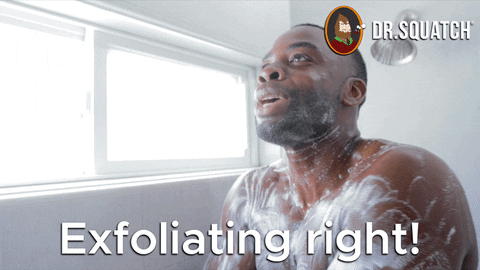 Giphy
GiphyI am a fan of DIY chemical peels; so much so that I wrote an entire article about it a couple of years ago (check out “I've Been Doing At-Home Chemical Peels. Here Are The Pros And Cons.”). The things that I like most about them are they are a super-effective way to exfoliate and even out my skin tone. That said, though, be careful with doing too much exfoliating whether it’s via a chemical peel, a skin scrub or even dry brushing.
Not only can over-exfoliating irritate your skin, it can dry it out, cause lots of skin flakes, lead to inflamed skin — and all of this can result in hyperpigmentation as your skin is in the process of “getting back to normal.” So, just how often should you exfoliate? Unless your skin is really oily, 1-2 times a week is more than enough (2-3 if it is on the oily side).
Layering with Too Many Products
 Giphy
GiphyOh, I know — if you watch too many of those TikTok and Instagram videos where women are applying 6-10 products on their face before adding any make-up to it, it can tempt you to follow suit. Use some caution with that, though. Each skincare product comes with its own list of ingredients and every time you add something else that has another set of ingredients onto it, that increases the chances of you irritating your skin or causing it to break out.
My two cents would be to ease into each product. Start with one thing and, if it’s all good (after about a week or so), incorporate another. Oh, and try to keep it down to 3-5 skincare products tops. When it comes to effective skin routines “less is more” is a motto to live by. Otherwise, redness, flaking and hyperpigmentation may be in your future.
Using Skincare Products That Contain Fragrance
 Giphy
GiphyAlthough applying skincare products that have a nice scent to them can cause your skin to smell amazing, sometimes they can be both an irritant as well as an allergen — and that can cause your skin’s barrier to weaken or become really irritated. And again, whenever your skin is damaged in some way, the recovery process can lead to hyperpigmentation. So, it really is best to avoid scented skin products at all costs (if you want flawless skin, that is).
Applying Too Much Heat
 Giphy
GiphyBet you didn’t see this one coming. How about increased blood flow, over time, can lead to hyperpigmentation. Basically, it’s because of the fact that, sometimes, too much consistent blood flow can result in skin inflammation and, as we already discussed, when the body is healing from inflammation, that can sometimes cause hyperpigmentation to occur.
The takeaway here: use sunscreen when you’re outdoors and try to keep those scorching hot showers to a minimum. Being in warm water for between 7-10 minutes is ideal.
Not Testing Products (Especially Acids) on Your Arm First
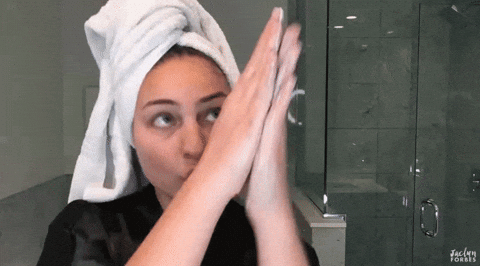 Giphy
GiphySomething that definitely keeps my skin glowing is certain acids: hyaluronic acid, mandelic acid and kojic acid soap (oh and some vitamin C extract too), especially. All of these are pretty good on darker skin tones; however, because we all are different, before applying any acid to your skin, make sure to test it on your arm first (and wait 48 hours, just to be sure that the coast is clear).
Trust me, I know of what I speak because I once tried some pretty potent pineapple extract on my face once and it mildly burned the lower part of my right cheek to the point where it took about four months before everything turned back to normal. Hmph, if I can keep anyone from experiencing that drama, I absolutely will.
7. Experimenting with Harsh Essential Oils
 Giphy
GiphyListen, if you want a zit to go away, damn near overnight, apply some tea tree oil to it. Just make sure that you dilute it with a light carrier oil (like grapeseed, jojoba or rosehip oil) first. Why? Oh, I have learned from very up close and personal experience that certain essential oils can also burn your skin and, as we’ve already discussed, ad nauseum at this point, damaged skin typically results in hyperpigmentation on some level. Yeah, essential oils are a blessing. They are also nothing to play with. Dilute, dilute, DILUTE.
___
You know, they say that it can take several weeks, if not many months, for hyperpigmentation to totally fade away. Hmph. To me, that’s even more incentive to do all that you can to avoid it transpiring in the first place — and that includes NOT incorporating counterproductive skincare routines and regimens.
The more you know, sis. For real.
Let’s make things inbox official! Sign up for the xoNecole newsletter for love, wellness, career, and exclusive content delivered straight to your inbox.
Featured image by Shutterstock



